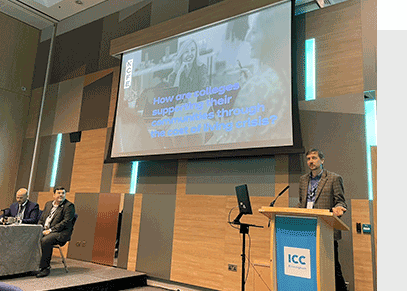Key asks and campaigns

From tackling workforce challenges to championing the role of educators, we’re on a mission to promote and advance learning to help create a fairer society.
As a charity and leader in technical and vocational learning, we’re serious about changing education for the better. We firmly believe that in a sector that’s constantly changing, we need to help shape that change - we don’t just challenge the status quo, we challenge ourselves to resolve it.
Whether we’re developing new qualifications and resources, harnessing deep insight through research, collaborating and investing to make a social impact, driving policy changes, or getting to grips with skills shortages, we’re focused on the key issues that will help ensure no learner is left behind.
T Levels are a high-quality, work-focused alternative to A Levels for those aged 16-18. The two-year courses are designed with employers to reflect the needs of the sectors and occupations they’re designed to serve. We’re committed to making T Levels a success as they provide an opportunity to address inequalities for young people accessing skills and employment.
- It’s important that the government continues with its commitment to supporting vocational and technical education.
- The skills agenda needs to be the top priority for the government to ensure the progress made so far is not lost.
- More needs to be done to increase awareness and shape public opinion around how vocational qualifications can create high-skilled workers.
- T Levels are unique in that they've been developed with employers and include a substantial industry placement element which provides learners with a myriad of skills that cannot be taught or experienced in the classroom.
To underpin T Levels, and ensure they are as successful as possible, we have carved out three core principles that are required:
-
- Investment in Infrastructure, both for facilities and educators.
- Creative and flexible approach to industry placements.
- Employer-backed, sector-specific campaigns which speak to the whole range of educational options.
Visit our dedicated T Levels page to find out more.
We want to help tackle the retention and recruitment crisis faced by the social care sector. The UK faces an increasingly ageing population coupled with the impact of the cost-of-living crisis. With historic cuts to funding in the sector and a lack of access to roles in social care, we need to do more for this essential service.
- We encourage the Government to expand the suite of qualifications and create more routes into the sector.
- Expanding routes specifically for young people to get into social care would help tackle the retention and recruitment crisis.
- We need to translate the increased interest from students pursuing vocational and technical qualifications related to health and social care into real workforce change.
- It’s vital that those who want to pursue a career in the sector are given every opportunity to access these courses through sufficient funding and support. This will help to bring diversity into the sector (the average age for starting work in adult social care is currently almost 36).
- The new Care Certificate is a positive step for the sector and we’re proud to be part of its delivery. Learn more about the Care Certificate on our dedicated page.
We must do more to shift the current dated, disconnected and transactional approaches to assessment into systems and approaches that are truly transformational for learners, educators and educational institutions. Our vision is to break boundaries and promote innovation that creates robust and reliable assessment within an intelligent education ecosystem.
- We need to reconsider the purpose of assessment, harness technology, and trial new approaches. We believe that in doing this, assessment itself can deliver greater benefits for learners and employers.
- Innovation is especially important for differing learning and neurodiversity needs and approaches, and visible, hidden and acquired disabilities. We must provide an equitable basis for progression and achievement.
- Through enhanced use of technology, such as virtual and augmented reality, both online and in-person methods should be harnessed to support the achievement of skills, knowledge and behaviours.
- We must help learners to fulfil their potential, not just in terms of academic attainment or employment outcomes, but also their wellbeing, mental health and happiness – this means exploring new assessment methods.
- Assessment must be an integral component of the learner journey that highlights learner, educator, and institution level strengths.
- To facilitate innovation, there should be a ‘regulatory sandbox.’ This would enable testing new approaches to assessment on real learners, provide the evidence needed for robust evaluation, and confirm that assessment beyond the current state is viable.
- We launched the Assessment Innovation Fund in 2021 to support the piloting of new ideas and forward-thinking initiatives within all areas of education. You can learn more about the fund's impact by reading our AIF Social Impact Report 2021-23.
Our ongoing passion for, and commitment to, the early years workforce across all aspects of our work continues to drive NCFE forward to support the sector in any way that it can. We must be sensitive to the challenges facing the sector; significantly the economic climate and increased staff demand amidst high turnover from the ongoing recruitment and retention crisis.
- Balancing the demand for Level 3 staff and the rollout of funded childcare places by the government continues to challenge the sector.
- An estimated 50,000 more staff could be needed in 2024, and again in 2025, to maintain existing provision and provide the expanded entitlement.
- Research from the Early Education and Childcare Coalition (EECC) also revealed that 57% of nursery and preschool staff and 38% of childminders are considering leaving the early years sector.
- A recruitment and retention crisis leads to an inevitable skills gap in the workforce. With any large turnover of staff, there are implications for stability, and this may equate to vulnerabilities in leadership and management.
- Staff joining are not staying. Where they are staying, they are taking up management and leadership positions with little post-qualification practice, whilst more experienced staff are the ones that leave.
- Find out more about the workforce challenges facing the sector by reading our Skills Gap Report.
Get in touch
Our Media team
Elliot McGrath, Senior PR and Communications Manager
Samantha Lade, Senior PR and Communications Officer




